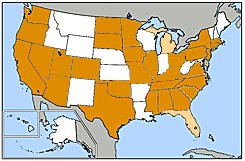Norfolk, VA

Where do folks get the idea that if you’re an expert on something, you’d be a good teacher? In the final presidential debate, McCain was talking about how we ought to have more programs like Teach for America and Troops to Teachers and less certification to become a teacher. We should basically just take them from the battlefield, or the boardroom, or wherever, straight to the classroom. We need teachers now!
What a ridiculous idea. Most of these people would be eaten alive, wouldn’t last more than a couple of years, and the kids would suffer the most. The idea that we can “fast-track” people into the classroom is seriously flawed. When people say that an expert in their field would make a great teacher, they’re ignoring what research and experience tell us is most important to their success: good pedagogy, passion for learning, and a love for children.

I met Chauncey Veatch, the 2002 National Teacher of the Year, last weekend at a task force on the arts in New York. What an incredible guy. Each day, he teaches high school, middle school, 4th grade, and pre-school kids. Most of them don’t speak much English, are from extremely poor families, yet their success rate in school is remarkable. Many of them go to top colleges. Chauncey is a product of Troops to Teachers, and goes to show that career folks can make highly effective teachers. I had a similar path from professional forestry, but went through a more traditional masters degree program. TFA and TTT are great programs, but they are the minimum we should expect in teacher prep. And many of these new teachers don't last long, or are ineffective in the classroom.
Good teaching can be learned, but it usually takes time and guidance. Programs that minimize the time as a student teacher under the guidance of a master teacher, or that aren’t providing enough educational theory and research to fully prepare people for the rigors of the classroom are doing a great disservice to the pre-service teachers and to the students. There are exceptional people who will make great teachers no matter how they get there, but in general, the idea that we need less rigorous certification processes will not benefit our educational system or our children.
It’s a slap in the face to educators to imply that any expert in a field can teach, because we know that teaching is so much more than imparting content knowledge. Great teaching is art, science, pedagogy, passion, love, expertise, patience, and hard work.
What you teach is not nearly as important as how you teach.
[For another excellent response to this debate question (in fact, questioning the question), please check out my colleague Mike Smart’s commentary at http://www.toymn.org/the-wrong-question.htm. Good stuff.]









No comments:
Post a Comment
Feel free to question, disagree, challenge, or make suggestions! I'm a big boy. I can take it.